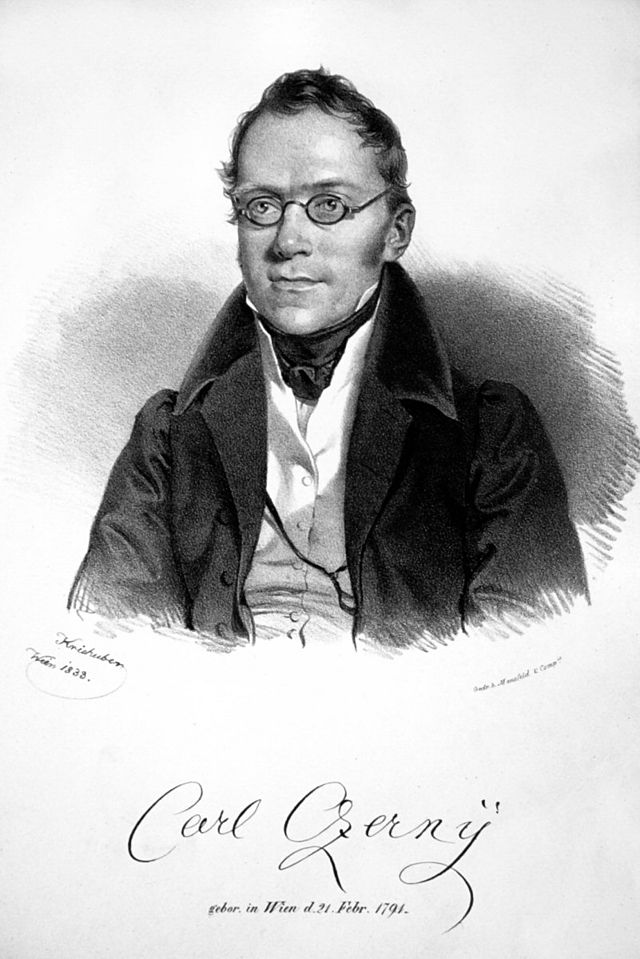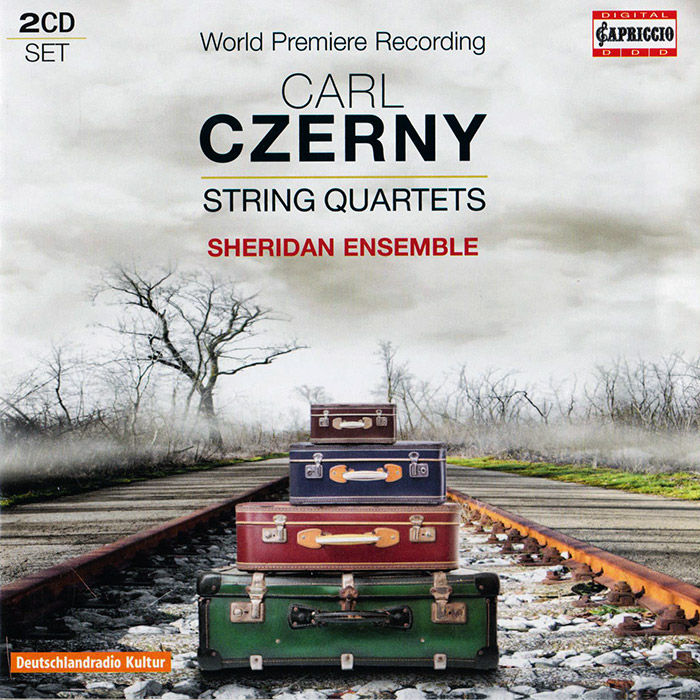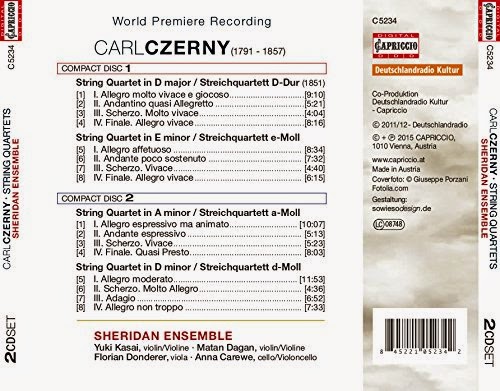Share This
Album at a Glance
Tags
Related Posts
- Roman Statkowski (1859-1925): Piano Music / Barbara Karaskiewicz
- Walter Braunfels: Orchestral Works, Vol. 2 / BBC Concert Orchestra; Johannes Wildner
- Steve Wilson & Wilsonian’s Grain: Live in New York - The Vanguard Sessions
- Music from America & Abroad for Oboe, Bassoon & Piano / John Dee, oboe; Timothy McGovern, bassoon; Cara Chowning, piano
Carl Czerny (1791-1857): String Quartets / Sheridan Ensemble
Posted by Paul Ballyk on May 11, 2015 in Classical | 2 comments
What circumstances would compel a composer to purposely conceal his finest compositions, while at the same time publishing an abundance of, if not mediocre, certainly second-rate music? The name Carl Czerny (1791-1857) has been known to generations of pianists as the author of the most widely used method books and exercises for the student pianist. He also published well over 800 opuses of études, nocturnes, sonatas, variations and other pieces for piano, popular in the salons and parlors of 19th-century Vienna. However, it is not widely known that there also exists a large body of "serious" compositions (masses, symphonies, choral music, chamber works, songs), existing in manuscript form only, that Czerny wrote and quietly shelved, never allowing them to be heard.
In the area of the string quartet alone, there exist at least 20, and possibly as many as 40 quartets. This new recording by the exceptional Sheridan Ensemble of four of these quartets, including two appearing as world-premiere recordings, is a landmark release. It's one I expect will factor in some of the most influential "best of 2015" editors' choice lists for the year. Czerny's music is superb; the Sheridan's performances are magnificent.
The quartets are written in a manner decidedly centered on Classical models, expertly crafted with forms and styles that bring to mind Haydn and early Beethoven. They are believed to have been written in the middle of the 19th century, so are clearly influenced by the early romantics, such as Mendelssohn and Schumann. There's a freedom and spontaneity to Czerny's writing that makes these quartets sound as though they were produced effortlessly. The outer movements are rich in motivic diversity, full of restless energy with exciting, forwardly driven sections of development. The slow movements have a subdued reticence to them, loving and heartfelt. Three of these four quartets are in minor keys. The very impressive sample track is the Finale, Allegro vivace from one of these.
So, why did Czerny conceal his finest work? Sheridan Ensemble cellist Anna Carewe proposes in the album liner notes that Czerny, rather unsure of himself, did not want to risk his highly successful career as a teacher and composer of lighter fare by drawing criticism for his serious work. Whatever the reason, these quartets suggest that Czerny, the composer, was a major talent. Perhaps the perception of him as a pedagogue who also wrote some music will be turned on its head over the coming decade, and he will become known as an exceptionally gifted composer who also codified an important set of study methods for modern piano playing. On evidence of this revealing release, such a reevaluation would be well deserved.
Known as a piano teacher, with whose works almost every piano pupil should be familiar, and possibly also as a pupil of Beethoven, Carl Czerny enjoys very little fame as a composer today. The composing maniac (with over 800 published works) acquired a great reputation (and fortune) from his pedagogical activities; his compositions and publications intended for students were met with eager and expecting audiences and as such were sufficiently remunerative so as to dominate his creative efforts. However, Czerny also left a vast body of serious music, much of which remains unrecorded.
Czerny composed in the tradition of Haydn and Beethoven. Echoes of Mendelssohn can be discerned as well as a romantic style full of drama and profundity of expression. The quartets on the present disc have only been passed down as manuscripts from Czerny’s estate, which can be found in the archives of the Society of Friends of Music in Vienna.
Source: Capriccio Records
 Carl Czerny |
Carl Czerny, composer Carl Czerny (1791 – 1857) was an Austrian composer, teacher, and pianist of Czech origin whose vast musical production amounted to over a thousand works. His books of studies for the piano are still widely used in piano teaching. A child prodigy, Czerny began playing piano at age three and composing at age seven. His first piano teacher was his father, who taught him mainly Bach and Mozart. He began performing piano recitals in his parents’ home. Czerny made his first public performance in 1800 playing Mozart’s Piano Concerto No. 24 in C minor. In 1801, the Czech composer and violinist Wenzel Krumpholz scheduled a presentation for Czerny in the house of Ludwig van Beethoven. Beethoven asked Czerny to play his Pathétique Sonata and Adelaide. Beethoven was impressed with the 10-year-old and accepted him as a pupil. Czerny remained under Beethoven’s tutelage for the next three years. He particularly admired Beethoven’s facility at improvisation, his expertise at fingering, the rapidity of his scales and trills, and his restrained demeanor while performing. Czerny maintained a relationship with Beethoven throughout his life, and also gave piano lessons to Beethoven’s nephew Carl. As a composer, Czerny left a very large body of work (more than a thousand works and up to Op. 861). Czerny’s works include not only piano music (études, nocturnes, sonatas, opera theme arrangements and variations) but also masses and choral music, symphonies, concertos, songs, string quartets and other chamber music. The better known part of Czerny’s repertoire is the large number of didactic piano pieces he wrote, such as The School of Velocity and The Art of Finger Dexterity. He was one of the first composers to use étude (“study”) for a title. Czerny’s body of works also include arrangements of many popular opera themes. The majority of works referred to by Czerny as “serious music” (masses, choral music, quartets, orchestral and chamber music) remained unpublished. The manuscripts are held by Vienna’s Society for the Friends of Music, to which Czerny (a childless bachelor) willed his estate. Source: Wikipedia
|
 Sheridan Ensemble |
Sheridan Ensemble, string quartet An ensemble without artistic compromise, where the dreams of each individual member become reality - it is with this vision in mind that the cellist Anna Carewe founded the Sheridan Ensemble in 2007. The unique combination of instrumentalists who regularly work with some of Europe’s leading orchestras and ensembles, a prize-winning jazz artist, an international vocal star from the Musical and Cabaret world, a harpsichordist equally renowned for his interpretation of New and Baroque, as well as guests invited to join the ensemble for specific projects, serves as a melting pot for creativity with each member looking to cross the borders of his own musical world into a new realm. Ever since making its first appearance at the Ultraschall Festival for New Musik in Berlin in 2008, the Sheridan Ensemble has earned the praise of the critics and public alike for its innovative programs. Whether framing the expansiveness Morton Feldman with haiku-like miniatures by Howard Skempton, linking freely notated compositions of Christian Wolff and Bruno Maderna with solo recorder interludes or interlacing Couperin, Telemann, Messiaen and Kurt Weill with movements by Kaija Saariaho, a motto for many programs is to put contrasting compositions side-by-side, letting them flow seamlessly from one to another, in order to stimulate the listener into hearing the music in a fresh way. Nevertheless, with repertoire ranging from Diego Ortiz (around 1550), Dowland, Purcell, Couperin, Haydn, Mozart, Beethoven, Mendelssohn, Schubert, Brahms, Schoenberg up to 20th and 21st composers from the Classical or Jazz world or the greats of the Musical and Cabaret scene, such as Gershwin or Weill, the Sheridan Ensemble is at home presenting almost any program, whether mainstream or utterly original. The ensemble is named after the Irish writer, political satirist and politician Richard Brinsley Sheridan (1751 - 1815), whose outspoken criticism of the British government on social and human rights issues once almost cost him his life. His friend Lord Byron once said of him: “Everything that Sheridan has done or chooses to do is par excellence the best of its kind” - words which serve both to inspire and challenge the musicians of the Sheridan Ensemble. Source: www.sheridan-ensemble.de/ |
![]() About Paul Ballyk
About Paul Ballyk
all about Paul
Twitter •
| Thinking about purchasing this album?
Follow this link for more album details or to make the purchase. Buy it now |
“Not just recommended. Guaranteed.”
We stand behind every album featured on Expedition Audio. Our objective is to take the monetary risk out of music exploration. If you order this album from HBDirect.com and do not like it you can return it for a refund.
Carl Czerny: Symphony No. 5 in E flat major








i would like to obtain the sheet music parts for the Czerny string quartets which the Sheridan Ensemble so wonderfully recorded.can you provide any information on how I can obtain the sheet music.
Thank you.
Dear Mr Abramson,
How nice to read that you enjoyed the Czerny String Quartets we recorded -the music really is quite remarkable! Unfortunately, the music remains unpublished. We have found there is so much interest in these pieces taht it would be great to try and get the sheet music published at a later date.
Please feel free to email me for further information!
Best wishes,
Anna